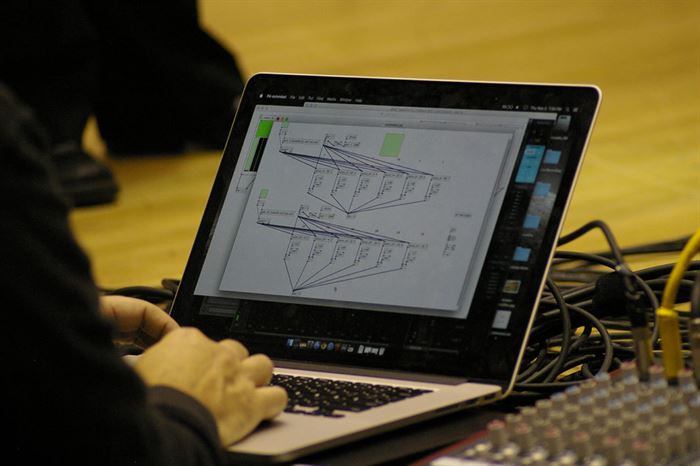7.24.17 | School of Music News | Daniel Grabois | Original Publication

This fall, the Mead Witter School of Music will add a new studio to Humanities: the Electro-Acoustic Research Space (EARS). Located in a former classroom, EARS will be stuffed with the latest electronic music equipment, and will be available to faculty, students, and collaborators within the School of Music and in other departments.
Grand opening: Friday, September 15, 7:30 PM, Room 2401 (street level), Mosse Humanities Building, 455 North Park Street.
I am the horn professor at the School of Music, and I’m very interested in contemporary music. Honestly, I also dream of rocking out on the French horn, and you can’t really rock out unless you plug in. When I got to UW-Madison six years ago, I started to dream about ways to plug the horn into electronics in order to experiment with creating new kinds of sounds for my instrument. Since at least the 1950s, guitar players have been plugging in. Electrical amplification, and subsequently distortion and myriad other effects, transformed the guitar from a folk and ethnic instrument into the backbone of much of today’s popular music. With modern technology, any acoustic instrument can be coupled with sound-altering electronics.
More recently, bands like Radiohead have created a seamless connection between computer music and acoustic sounds. It was time for the modern era to make its way into horn-land.
The School of Music didn’t have any equipment, so I began acquiring some: microphones, pedals, software. With Trombone Professor Mark Hetzler, I co-founded $2 Broom, a student electro-acoustic improv ensemble, but the difficulties of moving my equipment around Humanities for rehearsals and performances led to a short lifespan for this ensemble.
After a long process of learning, experimenting, and tinkering, I released a solo CD of my own music for “electric horn.” Then I started thinking bigger. I consulted with universities that have huge studios of this kind, such as McGill University in Montreal and New York University. I spoke with colleagues about the latest inventions. I thought about creating a space where composers, improvisers, bands or chamber groups or soloists, could experiment and broaden the definition of classical music.
Finally, a grant opportunity opened up for the arts: in 2015, the Wisconsin Alumni Research Foundation and other sources sponsored UW2020. UW2020, according to the program parameters, is a “large equipment grant” program intended to “stimulate and support highly innovative and groundbreaking research at the University of Wisconsin–Madison over the next five years.”
Clearly, the time had come for the School of Music to embrace what the modern era has to offer, and I applied for a hefty sum to create a state-of-the-art facility. Thankfully, in the second round of funding, we received an award of over $150,000 (quite unique, I might add, as the only arts-related grant in the mix), and that new facility will open this September.
What’s in it? Computers, of course. Software galore. Pedals. Electric keyboards. A theremin. Microphones, interfaces, speakers. Cameras, printers, headphones, mixing boards. Electronic percussion. A Moog synthesizer. There will also be a mobile unit to record classical music, as EARS will not be a recording studio. And much, much more.
Several noted UW-Madison alumni have embraced electro-acoustic music, notably Paula Matthusen (BM, 2001, assistant professor of music at Wesleyan University) and Kevin Ernste (BM, 1997, professor of composition at Cornell University) who were guests at our 2015 Alumni Composers Festival. EARS will be available to alumni, current students and faculty, and to faculty researchers outside the School of Music. And I will revive $2 Broom, which will have a permanent home in EARS.
Special thanks to Director Susan C. Cook, who found funds for a room renovation, and to all the vendors who supplied equipment, notably Full Compass, a local firm that offered the winning bid on a large package of equipment.
I will host monthly open houses at EARS, but we’ll start the year off with a grand opening on Friday, September 15, 2017, at 7:30 pm. EARS is located in room 2401 in the Mosse Humanities Building.